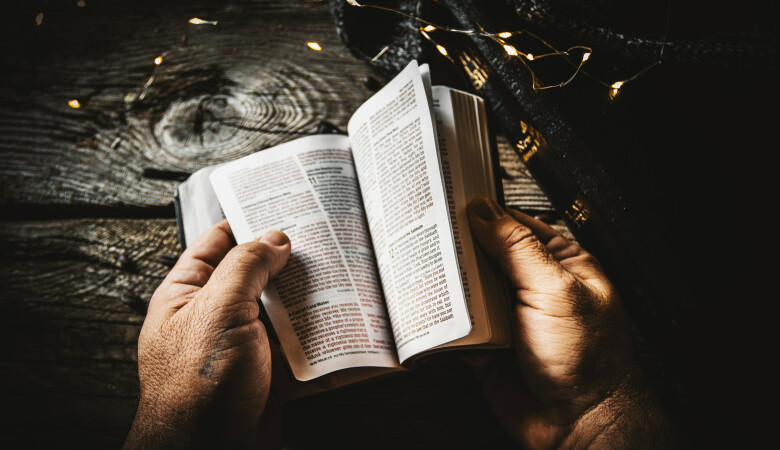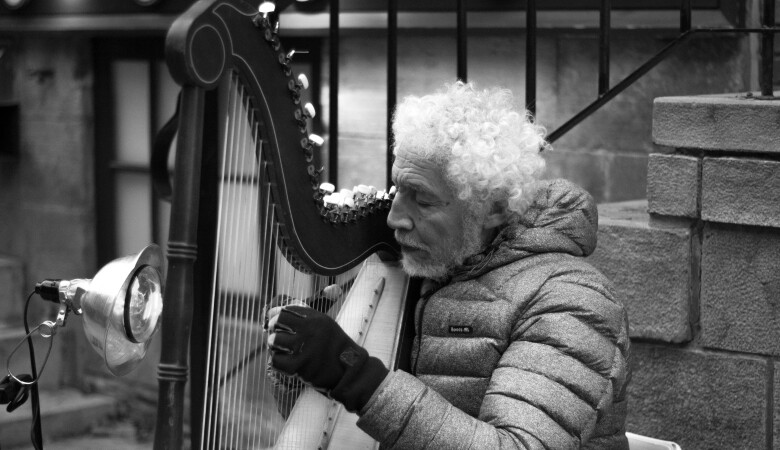What Are You Doing More Than Others?: The Supernatural Life of a Christian (Matthew Sermon 14 of 151)
May 02, 1999 | Andy Davis
Matthew 5:38-48
War Against the Flesh, Stewardship
I. Introduction
I'd like to begin by reading you a story of some local history that I came across recently, which I found fascinating. In the year 1837 a duel took place between Congressman George Dromgoole and hotel owner Daniel Digger near Gaston, North Carolina. Shortly after sun up the challenger arrived, riding in a high-wheeled carriage with his friend and a physician. Moments later the challenger arrived in a wagon driven by his friend. A bed had been laid in the wagon, which was to serve as an ambulance, should one be required. Everyone was in formal dress. The physicians were business like, having their sleeves rolled up and carrying forceps and tourniquets. The two duelists, filled with hatred for each other, said their 'good mornings' with curt civility and then looked away. Their helpers busied themselves selecting the dueling ground, choosing a piece of level land, near the river bank. Walking together, the helpers stepped off 10 paces with slightly exaggerated strides. Pegs were driven in at the spots where the shooters would stand. Each helper loaded two pistols for his man. A coin was tossed, the ground was selected and the time had come. The doctor stood near the ambulance wagon as the duelists walked somberly to the pegs which had been driven into the ground. They stood facing each other with their pistols pointed downward towards the earth. Suddenly the word was given. Each dualist raised his arm, cocked, aimed and fired quickly. The sound of the shots was almost simultaneous and no one could tell who had fired first. There was a rustle of startled birds, then thick silence. The smoke lifted. One of the combatants sank slowly to his knees and fell heavily face down. The doctors rushed to him but there was nothing that could be done. He was dead before they reached him. This scene in one detail or another had been replayed and was replayed many times during that era of our nation's history. An insult was given, gloves were removed, a face was slapped and pistols were drawn at dawn the next day. A “point of personal honor” said the spirit of the age. But Jesus Christ says, "This is pride".
II. Life in the Kingdom of Heaven: Dealing with Evil People Selflessly
In the Sermon on the Mount Jesus points to a higher law. Jesus Christ, through the words of the Sermon on the Mount, challenges us to lay down our personal honor and live for the honor of someone higher — the honor of God, the eternal Father. Notice in the Sermon on the Mount that Jesus Christ, who is the master law giver, takes the law and reaches right in to our hearts; to analyze them, to sift them to see what's really there, and to convince those who perhaps are unconvinced, that they really do need a savior because the Kingdom of Heaven is really only given to those who are spiritual beggars. "Blessed are the spiritual beggars for theirs is the Kingdom of Heaven” we've been saying. We see in Matthew that Jesus is able to take the law and go to a deeper level. Recently I have come to think of the commands of God differently than I thought of them before. The commands of God come to me, commanding me what I should be and must be. But, by the power of the Holy Spirit with Jesus Christ living in me, I see that they have changed now, and that these commands are not just what I should and must be, but what I can be today and what I most certainly will be in the future."
As we look through the Sermon on the Mount we see that it's just not a matter of murder, it’s a matter of anger. That means I can be free of anger today and will be someday totally free of anger. It's not just a matter of being free from adultery, it’s a matter of being free from lust. Not just that I can and must be today but that someday I will totally be free through the commands that He gives us. As we look at verses 38 through 48, think of it that way. If you are a Christian today, Jesus Christ is calling you to a higher level, a higher standard than the way the world settles it's conflicts, the way the world deals with enemies, the way the world deals with difficult or evil people. The Apostle Paul said in Ephesians 4:1, "I urge you brothers, as a prisoner of the Lord, to live a life worthy of the calling you have received." What is that calling? It's a high calling. Be perfect therefore as your Heavenly Father is perfect. Listen now to the words of Matthew chapter 5 verse 38 through 48. "You have heard that it was said, eye for eye and tooth for tooth. But I tell you do not resist an evil person, if someone strikes you on the right cheek, turn to him the other also. And if someone wants to sue you and take your tunic, let him have your cloak as well. If someone forces you to go one mile, go with him two miles. Give to the one who asks you and do not turn away from the one who wants to borrow from you. You have heard that it was said, 'Love your neighbor and hate your enemy.' But I tell you, 'Love your enemies and pray for those who persecute you that you may be sons of your Father in Heaven. He causes his sun to rise on the evil and the good and sends rain on the righteous and the unrighteous. If you love those who love you, what reward will you get? Are not even the tax collectors doing that? And if you greet only your brothers, what are you doing more than others? Do not even pagans do that? Be perfect therefore as your Heavenly Father is perfect.'"
Critics of the scripture say that Jesus Christ in the 'Sermon on the Mount' is over turning the archaic, old fashioned law of Moses. They say He's setting Himself against the law of Moses, and they point particularly to this example here in verse 38. "You have heard that it was said, eye for eye and tooth for tooth, but I tell you, do not resist an evil person." And they say, surely, here Jesus is contradicting Moses. I think it's a little bit strange that anybody would say this of someone who said, "Do not suppose that I came to abolish the law or the prophets. I did not come to abolish them, but to fulfill them until Heaven and Earth disappear and not the smallest letter, not the least stroke of a pen will buy any means disappear from the law until everything is accomplished." That's the heart of Jesus toward the law of Moses. But yet the charge is made, so we need to look at it.
In Deuteronomy 19:21, from the law of Moses, we get this command about eye for eye and tooth for tooth. It says there, "The judges in a civil case must make a thorough investigation of the case. The judges must purge the evil from among you. Show no pity, life for life, eye for eye, tooth for tooth, hand for hand, foot for foot." To whom is the law written? — to judges, to those judging civil cases brought to them. Why show no pity? — in order that the evil may be purged from among Israel, so that evil will not spread through that whole society. That's why the judges are instructed to show no pity. Is that what Jesus has in mind here? I don't think so. The principle of eye for eye, tooth for tooth, is to stop escalation. How many of you have ever heard of the Hatfields and the McCoys? They were a couple of famous feuding families from the great states of Kentucky and West Virginia, back in the late 19th century. Though I don’t know the specifics, I know that they did not like each other. A Hatfield was killed by a McCoy, then some of the Hatfields went out and kidnapped three McCoys and executed them. Now, do you see what I'm talking about? — the principal of escalation. One life leads to the taking of three lives. Why the escalation? Human pride; one Hatfield is worth three McCoys, you see? There's escalation. You take my eye out, I'm going to kill you. You see, my eye is worth your life—the principle of escalation. The Law of Moses puts into place the idea of no escalation— one eye is equal to one eye and one tooth is equal to one tooth. The Pharisees took the Law as a matter of personal application. They would be the judges moving through society judging everyone based on this law. They would be the ones who would take the eye or took the tooth. But Jesus here is speaking to the Christian person, to the member of the Kingdom of Heaven. Basically, in effect saying, "Don't press charges." If someone takes your eye, don't press charges. Do not resist the evil person. Don't look for retribution in this world. In effect, don't hurt back, don't take back, give it to God.” In no way does Jesus overturn the law of Moses.
III. Doctrinal Controversy concerning the Law
Now, there's a long history of doctrinal controversy over these verses that we're looking at. In the Christian church, there have been groups of people called the pacifists, those who believe that there should never be any resistance whatsoever made to evil. One example of this was Count Leo Tolstoy, who wrote the book, 'War and Peace’. Leo Tolstoy was a pacifist who got his pacifism from the verse we're looking at. "Do not resist evil", is what he said, and he believed that this verse, if properly applied, would leave there to be no police officers, no courts at all, no lawmakers, no military, no generals, nothing to resist evil in this world. But is that what Jesus says? It's interesting his writings were very influential on a young Indian who was studying law in England at the time. Mohandas K. Gandhi. Gandhi read Tolstoy's writings and read the 'Sermon on the Mount' and he took this principle of non-violence to his native land of India. Many people believe that this principle of non-violence won India it's independence. Gandhi loved the 'Sermon on the Mount' and thought it was the pinnacle of Christian morality, but he missed the true issue here. We're talking about the Kingdom of Heaven. We're talking about entrance into the Kingdom of Heaven. It only comes from those who grieve over sin and who know they need a savior. It's not a series of moral injunctions. Others are moderate pacifists, and they look to this and they say, "We shouldn't be involved in military conflict or we shouldn't be judges." Some of our own baptist ancestors, the Anabaptists believe you should never be, if you're a Christian, a magistrate, judge or in any position to be a judge based on their read of the 'Sermon on the Mount'. But context is king. Jesus here is speaking to those who are in the kingdom of Heaven. This is for Christians. It has nothing to do with non-Christians.
For the non-Christian, law is instituted by God, upheld by God. Governments are to be submitted to for their restraint of evil. But to the Christian, we're called to a higher level, a level of grace which the world cannot understand nor can it live out. Realize that this teaching has to do with you individually, personally. If someone strikes you on the right cheek, turn to him the other also. If someone wants to sue you and take your tunic, let him have your cloak as well. If someone forces you to go with him one mile, go with him two miles. Give to the one who asks you and do not turn away from the one who wants to borrow from you. It has nothing to do with whether a Christian should serve as a judge or in the military. I think the root issue here is the Christian's attitude towards self, toward who you are. The natural man, the natural tendency is to make self a god, to worship self. "How dare you do this to me? Do you know who I am? How dare you cut me off at the highway, don't you understand? It doesn't matter that I have the yield sign, I'm me, don't you understand? You can't do that to me." That's natural.
We're all like that, we all have that pride inside us. The natural man makes itself a god. Anything that wrongs self must be punished violently. But Jesus Christ calls us to something higher. If you want to be truly Christian, you have to do what to yourself? Deny yourself. Matthew 16:24 says, "If anyone would come after me, he must deny himself, take up his cross daily and follow me." What's the cross for? It's for death. So it's not just a matter of denying self, it's a matter of dying to self, dying to your own interest, your own opinions, dying to yourself. Jesus here takes us through three examples of what He means in terms of death to self: Death to self concerning your physical body, Death to self concerning your possessions, Death to self concerning your time or perhaps your effort, your work.
IV. Dead to Self Concerning One’s Body
Let's look at the first in verse 39. "You ought to be dead to self concerning your physical body. Do not resist an evil person." It says there, "If someone strike you on the right cheek, turn to him the other also." Isn't this one of the most famous injunctions in all of Christ's teaching? Turn the other cheek. The question is how many of us live it out? What happens when someone really strikes you? Maybe they don't do it physically, but maybe interpersonally. Do you turn the other cheek or does that viper come up from with inside. You can't do that to me. That's natural to all of us. Jesus is calling us to something higher. I read a story about a champion boxer named Billy Bray. In the 19th century, he was a coal miner, I believe in Wales, and he worked in the coal mines but in his spare time he won boxing matches one after another. He was a big strong man and nobody could defeat him in a challenge. The enemy, the opponent would be laying on the ground unconscious at the end of that boxing match. He made a lot of enemies during his non-Christian days and then suddenly came to faith in Christ. So the enemies rolled up their sleeves and said, "Now we've got him." One of them one day decided to challenge Billy Bray and came up to him and tapped him on the shoulder, and just as he turned around, he got punched right in the mouth. He was staggered a bit but didn't fall; blood was in his mouth. Everyone around was wondering what Billy would do to this guy. Now, in his natural physical strength he was able to render this man unconscious with one punch. Instead what he did was he delivered a spiritual blow. He said, "May God forgive you even as I forgive you." What do you think that did to that man? "May God forgive you even as I forgive you." I think that's incredible. This is what Jesus is calling us too. He's turning the other cheek. "If you want to hit me again, hit me again, I'll not hit you back. But I will pray for you because I'm concerned about your spiritual state." Isn't that powerful?
There's another story of Hudson Taylor, a missionary in China. He was the first missionary in the 19th century to what they call, 'go native'. He wore Chinese clothes, dyed his hair, and wore a long pony tail the way they did at that point. He was fluent in Chinese and sought to win as many as he could to faith in Jesus Christ. He was standing by a river bank and a ferry was coming toward him, and he hailed the ferry. The man knew Hudson Taylor. He knew who he was and he started moving toward him. At that moment, a rich Chinese man came just as the ferry was starting to dock. He saw this poor “Chinese” man standing next to him, and shoved him down into the mud. He then started to step on to the ferry that Hudson Taylor had summoned. The man with the ferry said, "I was called by the foreigner. He has first choice." "The foreigner? What foreigner?" He said, "Him." And then he realized who it was. It was Hudson Taylor. He was embarrassed. Hudson Taylor got up and wiped the mud off and invited the man, "Please come and take the ferry ride with me." The whole way across that river he shared Jesus Christ with him. He didn't insult him. He wasn't angry at him. He took it as an opportunity to witness to him, through faith in Jesus Christ, that he might have eternal life. What is the underlying attitude? It's simply this. My body is no longer my own. It doesn't belong to me. Jesus bought it with His blood. 1 Corinthians 6:19 says, "You are not your own. You are bought at a price. Therefore, honor God with your body." And so my cheek doesn't belong to me anymore. Jesus tells me that when I'm struck, I'm to give the other cheek too, and Jesus has the right to tell me that. He bought my cheek. He can do what He wants with my cheek. If He tells me to turn my cheek, I must do it because He bought it; He owns it. Were physical sufferings part of Christ's life? Yes, they were. He's not calling us to do anything He didn't do himself. Jesus is willing to do it, and He also enjoins it on us. The deep issue here is, whose are we? Who owns us? Romans 12:1 says, "Therefore, I urge you brothers. In view of God's mercy, to present your bodies as living sacrifices, holy and pleasing to Him." This is your spiritual act of worship. Give your body over to him in service to Him. It belongs to Him. It goes to a deeper issue too. I do not think it is just a matter of physical striking. We don't get struck much anymore. But, maybe we do in reputation. I think what Jesus is calling us to is to get beyond caring what our reputation is in this world. We really don't care what people think about us anymore. What matters is what Jesus Christ thinks. And so, it says in 1 Corinthians 4:3, "I care very little." This is what the apostle Paul says, "I care very little if I'm judged by you or by any human court. I don't even judge myself. It is the Lord who judges me. He's my audience. So, I don't care what my reputation is. I give it over and I just want to serve Him." Dead to self.
V. Dead to Self Concerning One’s Possessions
Secondly, it says that we are dead to self concerning our possessions. In verse 40 and 42. It says, "If someone wants to sue you and take your tunic, let him have your cloak as well." In verse 42 it says, "Give to the one who asks you, and do not turn away from the one who wants to borrow from you." How many of you ever heard a child, just learning how to speak, say the word 'mine'? “That's mine.” This is one of the first things that a child learns. The law of possession. "Those are my toys, my books. That's my bed, my blanket, my mommy, my daddy, mine. It's my stuff, so don't touch it. Nobody touch my stuff. It belongs to me." But what am I going to say about your stuff? It's not yours anymore. God gave it to you, and when Jesus died for you, you came, and said, "Everything I have is yours. It's yours for your purpose, anything you want. So if you bring someone to me, Lord God, who has a need of it, I give it. I'm not going to be storing up possessions here on Earth. I'm going to store it up in Heaven. I'm going to be an open pipe, an open conduit with no blockage. Stuff, the material possessions of this life, is just going to flow through me to the needy.” That's my attitude. I'm not going to have occlusion or blockage in this artery. I'm not going to accumulate. It's just going to flow through me, right to those whoever God leads my way. Jesus says that if anyone wants your shirt give them your outside cloak as well. And why? Because, "Blessed are the meek, for they will get it all back. They will inherit the Earth." You don't need to hold on in this life. If God has given you something now, it's to give away for the Kingdom of Heaven.
Now, what about these court cases? We've become a litigious people. Have you noticed that? One court case after another. You know what the Apostle Paul says? This is a revolutionary verse, 1 Corinthians 6:7: "Why not rather be wronged? Why not rather be cheated, than to go to court?" It's better for you as a Christian to be wronged and cheated, than to go to court. Now, how does that factor into your world view? Isn't it consistent with the Sermon on the Mount? I think it is. "Why not rather be wronged? Why not turn the other cheek? Why not rather be cheated?" That's what Jesus is saying. In effect, saying, "Go ahead. If you want to sue me and take my tunic, have my cloak too. But now, I have won the right to preach the Gospel to you. Sit down and listen, my friend, as I tell you about a God who loves you enough to die for you. And as I explain to you what will happen when that cloak is worn out, and it's of no use to you. At that point, what will you do? Will you still be living for this material world? Or, at that point, will you turn to God, and ask for forgiveness for your sins? So, with this cloak, I purchase an opportunity to preach the Gospel.” That's what I want to do.
Now, what about harder cases? What about people who come to us? We're an inner city church. We interact with beggars. We interact with people who are, even perhaps, professional beggars. Do we give to everyone and anyone who comes and asks for us? Well, no, Scripture interprets Scripture. It says in 2 Thessalonians 3:10, "The one who is unwilling to work shall not eat.” Apparently, there are some people we shouldn't give to, namely, the person who will not work. It's hard to discern the difference sometimes, I have to tell you. But I'd rather err on the one side. I'd rather give to somebody who will not work, than not give to a truly needy person. See, there's a danger to this. But yet, I know that there's a practical side to this. We only have so much we can give. And if we give to the charlatan, if we give to the con-artist, we don't have to give to those who are genuinely needy, and there are genuinely needy people. What Jesus is saying is just, "Let go of that clenched, white knuckle grasp you have on your possessions. Open up that hand, and then I will bring needy people to you, and I will guide you, and then that flow will occur to those who truly need it."
VI. Dead to Self Concerning One’s Time
Then, finally, He says, "We should be dead to ourselves regarding our time or our effort. "If someone forces you to go one mile, go with him two miles." The background to this, was that the Romans, occupying Palestine, made a law that any native could be forced or pressed into service, to carry baggage for the Roman army for approximately one mile. Can you imagine how the Jews did this? They're walking along in everyday life, and then some burly Roman soldier says, "You there, pick up that bag and carry it the requisite mile." Oh the insults, the rolling eyes, whatever. They would, with muttering, and with complaining, pick up that bag, and they would mark off... If you wanted to know the measure of one mile, just be with that Jewish person, as he carried it one mile, then down it went, dropped. Ah, enough of that," and walk away. But along comes a member of the Kingdom of Heaven. "You, pick up that bag." "Glad to. I rejoice in the opportunity to serve my Lord this way," and he picks up the bag, and goes right on past the first mile, and keeps on going. "Can I do that... Is it okay for me to carry the second mile?" What is the look on the Roman centurion's face? Shock, stunned. "What is the difference between you and that other person? I don't understand. You only have to carry it one mile." "I know, I know. It's my joy and my privilege to offer this sacrifice to my Lord, Jesus Christ." How do you think the Roman Empire was conquered for Christ? That's how it was conquered. How do you think this nation or this world's going to be conquered? By obeying the Sermon on the Mount, by living this kind of a life.
This, my friends, is a supernatural life, isn't it? This is not an everyday kind of life. There is nothing we can do in our natural power, to be dead to ourself concerning our body, to be dead to ourself concerning our possessions, to be dead to ourself concerning our time, or our work, our labor. It's not natural. But for the Christian who comes to that level of understanding these things, they resonate with what George Mueller said. This is what he said, "There was a day when I died. I utterly died to George Mueller and to his opinions, his preferences, his tastes, his will. I died to the world, and its approval, or its censure. I died even to the approval or blame of my brothers, and my friends. And since then, I have studied only to show myself approved unto God." Can I even describe to you the freedom of living that kind of life? Someone strikes you on the right cheek, "It's no matter. My cheek belongs to Jesus. Strike it again. I'm free in this matter and I'll pray for you."
VII. Loving Enemies Selflessly
This brings us very neatly to the next section, and that is that we should love our enemies selflessly. Matthew 5: 43-45: “You have heard that it was said, 'Love your neighbor and hate your enemy,' but I tell you, love your enemies and pray for those who persecute you, that you may be children of your Father in Heaven. He causes his sun to rise on the evil and the good, and sends rain on the righteous and the unrighteous." It's a consistent teaching, isn't it? This saying does not contradict the Law of Moses, because this was never said in the Law of Moses. Instead, He takes the spirit of the Law of Moses, and makes it normative for the members of the Kingdom of Heaven, "You are to love your enemies." This, I believe, is one of the most unique teachings of Jesus Christ. You're not going to find it Buddhism. You're not going to find it anywhere else. You're not going to find it in Hinduism or Islam. Only Christianity commands us that we should love our enemies. The question is, can it really be done? It seems so practical and so impossible. I should say, "Practically impossible." Can you really love your enemy? Jesus did it, didn't He? When He was up on the cross, what did He say? "Father, forgive them. They don't know what they're doing." "Oh, well, that's the Son of God. You see, I can't be that way." Yes, you can. You're supposed to be children of your Father in Heaven. You're supposed to be perfect, as your Heavenly Father is perfect. Yes, you can. I've got proof: Acts Chapter 7, at the very end of it, there's a man down on his knees and he's bleeding, showered by stones. His name is Stephen. What did he say right before he died? He said, "Father, don't lay this sin to their charge." What's your excuse? Stephen, he's just a man, just like you and me. It can be done. William Tyndale, right before he died, under the command of the tyrant king, Henry VIII said, "Lord, open the King of England's eyes. Lord, open the King of England's eyes, that he may see the truth." Not a prayer of hatred or anger, but a prayer that the Kingdom of Heaven might advance in England.
What is our motive? Is it for the conversion of those that are our enemies? Not primarily. It's for the glory of God in this Earth, that they may see your good deeds, and praise your Father who is in Heaven. The motive is that, God may be glorified by us, that we may be sons of our Father in Heaven. "He causes His sun to rise on the evil and the good. He sends His rain on the the righteous and the unrighteous," every single day. Every day, God blesses His enemies. Did you know that? Every single day, God gives blessing to those who don't care about Him, who blaspheme His name, who disobey His commands, who have not a single thought or concern about God. They never give Him a thought, but every day, He feeds them and gives them blessings. And we, who are in the Kingdom of Heaven, we are to be the same. We are to be sons of our Father in Heaven who does this. This is a supernatural life, isn't it? It's a difficult life. It's an impossible life in our own power, but with the power of the Holy Spirit living in us, it's not only possible, it's expected that we should live this way. Someday, when you are perfected in Heaven, you will be exactly like this. Matthew 5: 46-47, "If you love those who love you, what reward will you get? Are not even the tax collectors doing that? And if you greet only your brothers, what are you doing more than others? Do not even pagans do that? Be perfect, therefore, as your Heavenly Father is perfect."
I had a boss once, his name was Tom. For some reason, he never greeted me when I greeted him in the morning. I would say, "Good morning, Tom," and he'd walk by me. I thought, "Maybe he didn't hear me." So the next morning, I said, "Good morning, Tom," and he walked by me. And then, I thought, "Maybe he's hard of hearing." But then I saw him greeting his friends, and I realized that wasn't the problem. There was something else. I came to the point, it was like a fork in my road, and I said, "What am I going to do with this? Am I going to continue to greet him, or am I going to have a little pride and stop just casting my greetings in front of him, for him to trample?" At that point, God brought this verse into my mind, "If you greet only your brothers... " Listen to the question, "What are you doing more than others?" What is the implication to that question that Jesus asks? You should be better than that. You should be at a higher level. You should not be the natural man with pride, saying "I gotta have a little pride here. I can't keep putting my greeting in front of somebody who won't respond." No, you don't. We checked pride at the door a long time ago. We left it behind.
VIII. The Supernatural Life: What are you doing more than others?
What are you doing more than others? The implication is that you, as members of the Kingdom of Heaven, should be at a higher level. There's a different rule for you. You're not living for this world. You're living for the next world. You're storing up treasure in Heaven. You've got a higher call. “What are you doing more than…” Meditate on that. It’s a diagnostic question. Is your life a supernatural life? Is your response a supernatural response or is it utterly pagan? That's my question to you today. What are you doing more than others? Paul asked the same question, or raised the same issue in 1 Corinthians, when he said, “Strife and conflict in the church, divisions and disagreements in the church —this is a mark of a natural life." He's saying, "When there is strife and conflict, are you not mere men? Are you not acting in a normal way? You shouldn't be. You should be at a higher level. There shouldn't be this division. There shouldn't be these conflicts. There should be agreement, unity of mind and thought."
IX. Application
To conclude, I want to ask you this question. I want you to take this diagnostic question and bring it right into your heart: "What are you doing more than others?" I'm not saying, "Are you earning your salvation?" My friends, that's impossible. Good deeds will never pay for sin. There is one and only one payment for sin, and that is the shed blood of Jesus Christ. By faith in His name, all your sins, past, present, and future, all of them can be washed away. It's through simple faith in His name. I'm not saying, "Can you earn your salvation?" I'm saying, "Is there a supernatural power in your life? The kind that allows you to turn the other cheek, the kind that allows you to say, 'My possessions are yours, if you need them. If you really need them, they're yours.' Is there a supernatural power in your life, to say, 'My time, my hours of labor, are for you, God, however you want to serve them, however you want to use them.’” Is there that supernatural presence?
If so, rejoice and be glad, because great is your reward in Heaven. If not, can I encourage you to come to the cross? Can I encourage you to come to the cross, perhaps, even for salvation? Perhaps you don't know Jesus as your Lord and Savior the way you thought you did. And if you do, may I urge you to come to the cross, to understand that it's in the power of the cross, that we can live this kind of life. Can I urge you to come back to the beginning of the Sermon on the Mount, to be a spiritual beggar all over again, and say, "Lord, this does not characterize me. When people strike me on the right cheek, I want to hit 'em back twice as hard. And in this way, I'm a natural person, and I don't want to be that way anymore. I want my life, my possessions, my time to be yours, and I wanna give it joyfully and freely." This is my challenge to you today: Come to the cross and know the freeing power of the death of Jesus Christ.






























